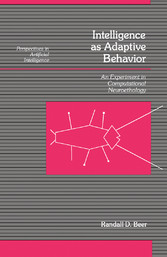Suchen und Finden
Intelligence as Adaptive Behavior - An Experiment in Computational Neuroethology
The 'intelligence' of traditional artificial intelligence systems is notoriously narrow and inflexible--incapable of adapting to the constantly changing circumstances of the real world. Although traditional artificial intelligence systems can be successful in narrowly prescribed domains, they are inappropriate for dynamic, complex domains, such as autonomous robot navigation.**This book proposes an alternative methodology for designing intelligent systems based on a model of intelligence as adaptive behavior. The author describes an experiment in computational neuroethology--the computer modeling of neuronal control of behavior--in which the nervous system for an artificial insect is modeled. The experiment demonstrates that simple, complete intelligent agents are able to cope with complex, dynamic environments--suggesting that adaptive models of intelligence, based on biological bases of adaptive behavior, may prove to be very useful in the design of intelligent, autonomous systems.
Key Features
* Provides a lucid critique of traditional artificial intelligence research programs
* Presents new methodology for the construction autonomous agents, which has implications for mobile robotics
* Of interest to researchers in a variety of fields: artificial intelligence, neural networks, robotics, cognitive science, and neuroscience
Alle Preise verstehen sich inklusive der gesetzlichen MwSt.










